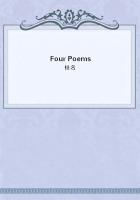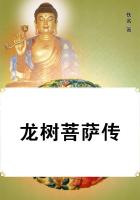/Paul./--Ah! I only want to have Virginia with me: without her I have nothing,--with her, I should possess all my desire. She alone is to me birth, glory, and fortune. But, since her relations will only give her to some one with a great name, I will study. By the aid of study and of books, learning and celebrity are to be attained. I will become a man of science: I will render my knowledge useful to the service of my country, without injuring any one, or owning dependence on any one. I will become celebrated, and my glory shall be achieved only by myself.
/The Old Man./--My son, talents are a gift yet more rare than either birth or riches, and undoubtedly they are a greater good than either, since they can never be taken away from us, and that they obtain for us every where public esteem. But they may be said to be worth all that they cost us. They are seldom acquired but by every species of privation, by the possession of exquisite sensibility, which often produces inward unhappiness, and which exposes us without to the malice and persecutions of our contemporaries. The lawyer envies not, in France, the glory of the soldier, nor does the soldier envy that of the naval officer; but they will all oppose you, and bar your progress to distinction, because your assumption of superior ability will wound the self-love of them all. You say that you will do good to men; but recollect, that he who makes the earth produce a single ear of corn more, renders them a greater service than he who writes a book.
/Paul./--Oh! she, then, who planted this papaw tree, has made a more useful and more grateful present to the inhabitants of these forests than if she had given them a whole library.
So saying, he threw his arms around the tree, and kissed it with transport.
/The Old Man./--The best of books,--that which preaches nothing but equality, brotherly love, charity, and peace,--the Gospel, has served as a pretext, during many centuries, for Europeans to let loose all their fury. How many tyrannies, both public and private, are still practised in its name on the face of the earth! After this, who will dare to flatter himself that any thing he can write will be of service to his fellow men? Remember the fate of most of the philosophers who have preached to them wisdom. Homer, who clothes it in such noble verse, asked for alms all his life. Socrates, whose conversation and example gave such admirable lessons to the Athenians, was sentenced by them to be poisoned. His sublime disciple, Plato was delivered over to slavery by the order of the very prince who protected him; and, before them, Pythagoras, whose humanity extended even to animals, was burned alive by the Crotoniates. What do I say?--many even of these illustrious names have descended to us disfigured by some traits of satire by which they became characterized, human ingratitude taking pleasure in thus recognising them; and if, in the crowd, the glory of some names is come down to us without spot or blemish, we shall find that they who have borne them have lived far from the society of their contemporaries; like those statues which are found entire beneath the soil in Greece and Italy, and which, by being hidden in the bosom of the earth, have escaped uninjured, from the fury of the barbarians.
You see, then, that to acquire the glory which a turbulent literary career can give you, you must not only be virtuous, but ready, if necessary, to sacrifice life itself. But, after all, do not fancy that the great in France trouble themselves about such glory as this.
Little do they care for literary men, whose knowledge brings them neither honours, nor power, nor even admission at court. Persecution, it is true, is rarely practised in this age, because it is habitually indifferent to every thing except wealth and luxury; but knowledge and virtue no longer lead to distinction, since every thing in the state is to be purchased with money. Formerly, men of letters were certain of reward by some place in the church, the magistracy, or the administration; now they are considered good for nothing but to write books. But this fruit of their minds, little valued by the world at large, is still worthy of its celestial origin. For these books is reserved the privilege of shedding lustre on obscure virtue, of consoling the unhappy, of enlightening nations, and of telling the truth even to kings. This is, unquestionably, the most august commission with which Heaven can honour a mortal upon this earth.
Where is the author who would not be consoled for the injustice or contempt of those who are the dispensers of the ordinary gifts of fortune, when he reflects that his work may pass from age to age, from nation to nation, opposing a barrier to error and to tyranny; and that, from amidst the obscurity in which he has lived, there will shine forth a glory which will efface that of the common herd of monarchs, the monuments of whose deeds perish in oblivion, notwithstanding the flatterers who erect and magnify them?
/Paul./--Ah! I am only covetous of glory to bestow it on Virginia, and render her dear to the whole world. But can you, who know so much, tell me whether we shall ever be married? I should like to be a very learned man, if only for the sake of knowing what will come to pass.
/The Old Man./--Who would live, my son, if the future were revealed to him?--when a single anticipated misfortune gives us so much useless uneasiness--when the foreknowledge of one certain calamity is enough to embitter every day that precedes it! It is better not to pry too curiously, even into the things which surround us. Heaven, which has given us the power of reflection to foresee our necessities, gave us also those very necessities to set limits to its exercise.
/Paul./--You tell me that with money people in Europe acquire dignities and honours. I will go, then, to enrich myself in Bengal, and afterwards proceed to Paris, and marry Virginia. I will embark at once.
/The Old Man./--What! would you leave her mother and yours?















